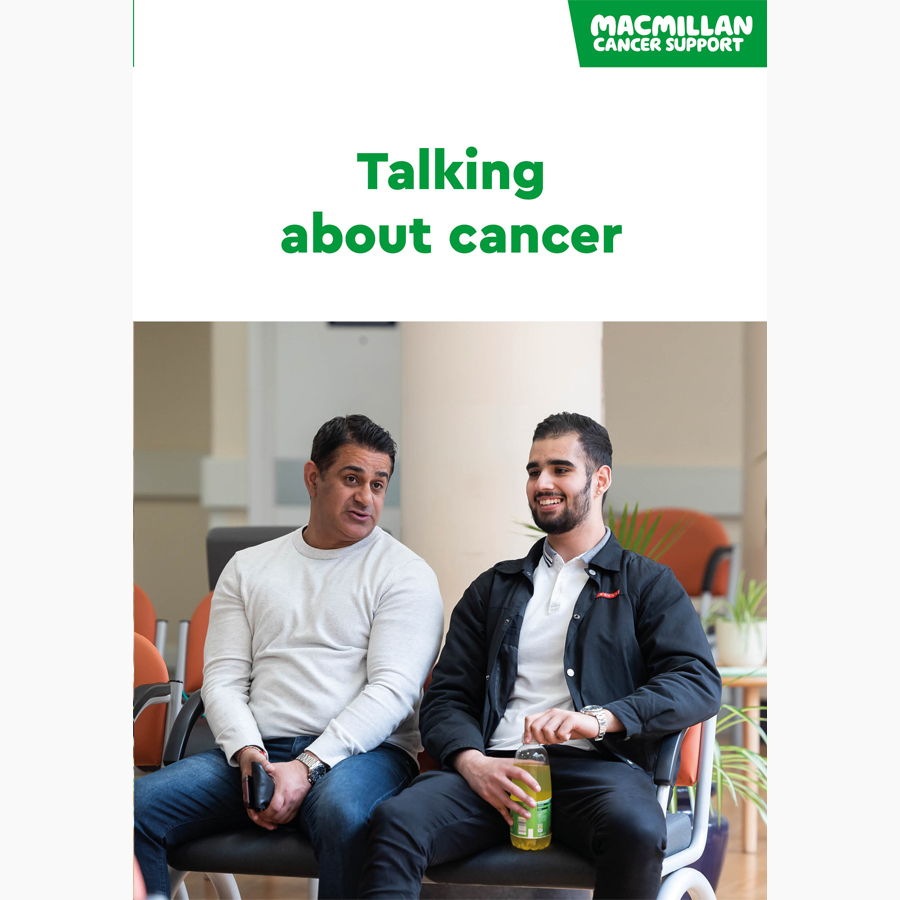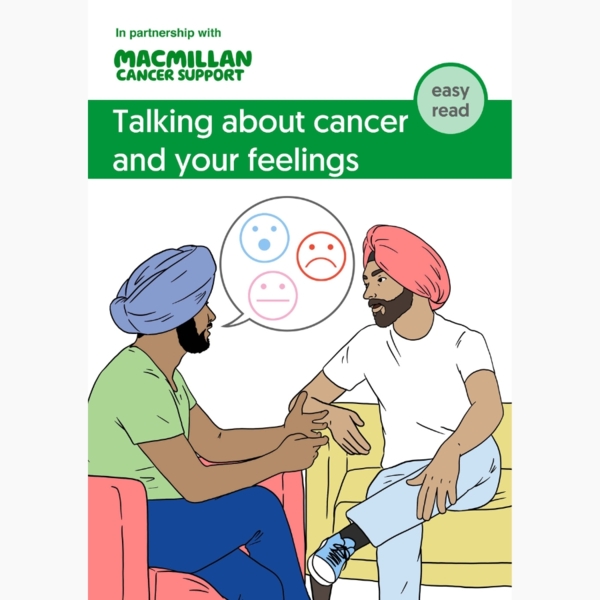Talking about your cancer diagnosis
Why talking can help
After a cancer diagnosis, you may find the idea of talking about it upsetting or uncomfortable. It may take you some time to accept your diagnosis.
But it is important to think about who needs to know and the best way to talk to them about it.
This can help you get the support you need at home, at work and from your healthcare team. It can also help you to make decisions that are right for you.
We have practical tips for how to tell people you have cancer.
We also have information about talking to:
The benefits of talking
Talking can help if you feel worried or uncertain. It can give you support and help you have some control over your situation.
-
Understand how you are feeling and why
Saying things out loud will often help you understand what you are feeling and why.
-
Help you feel that your feelings are normal
You may have lots of different emotions. Having someone listen to you without judgement may reassure you that what you are feeling is normal.
-
Feel more in control
Talking about any problems may make you feel more confident about dealing with them. It may also make you feel better about having hard conversations.
-
Make important decisions
Sometimes you may have to make decisions that affect others. You may think you know what other people are thinking or feeling but sometimes they surprise you. Talking to them can help you make tough decisions.
-
Feel more supported and less anxious
If you feel someone else understands, cares and is there for you, it can help you feel less alone.
-
Feel closer to your family and friends
Talking about personal issues with people close to you and including them in important decisions often makes them feel valued.
Who can you talk to?
Think about who you usually talk with about important issues or difficult problems. This is probably the best person to talk to.
This may be a partner, a close friend, a family member, a work colleague, a counsellor or a religious leader. It may be somebody who is going through or has been through a similar experience.
Sometimes it is easier to talk with someone you do not know. You may feel less pressure to act a certain way. You may also feel safe knowing that they will not share the conversation with your friends or family.
If you feel this way, you could:
- call the Macmillan Support Line for free on 0808 808 00 00
- join a support group
- have a talking therapy
- get support online, for example by joining our Online Community.
Talking about your diagnosis
Telling family and friends that you have cancer can be hard. You may worry about how they will react. Or you may feel guilty about the effect of the cancer and its treatment on others.
Although you may feel alone at this time, it is important to remember your diagnosis also affects them.
They will be worried about you because you are important to them. They may also worry about the changes you may have to make to your working life or education, and your finances.
If you have told your family and friends you have been for tests, they might be waiting to hear the results. You may feel forced into talking about the cancer before you are ready.
It can help to tell your family and friends you need some time to think about the diagnosis before you are ready to talk about it.
Telling people you have cancer
People usually tell the people closest to them first. We have practical tips for how to tell people you have cancer.
It is also important to tell any children you have. Depending on how old they are, you might need to prepare more for this conversation. We have tips for talking to children and teenagers.
We also have advice for talking to people at work.
Other people's reactions
People have different reactions when you tell them you have cancer. This may be because of experiences they have had. But it can also be about how well they cope with change.
Some people will be keen to support you. They may even want to talk about things before you are ready.
The news may make some people uncomfortable. Some family members or friends may say nothing. This could be because they are afraid of saying the wrong thing. You may have to bring the subject up.
It can help to think about why someone may not react in the way that you expect:
We have more tips on dealing with people’s reactions to the cancer.
You can visit healthtalk.org to watch videos of people talking about their cancer experiences and how they coped with other people’s reactions.
Your family and friends may find our information about talking with someone who has cancer useful.
They could also visit our Online Community. It has a group for family and friends to share experiences and feelings, or get support from other people with similar experiences.
If you do not want to talk
Some people do not want to talk about their thoughts or feelings, or about the cancer and its treatment. They would rather just get on with life. They may find they cope better if they do normal, day-to-day things and do not talk about the cancer.
If you do not feel ready to talk, you could practice what to say when people ask how you are. For example, you could say, ‘Thank you for asking how I am. I’ll let you know when I feel ready to talk.’
But not talking about the cancer at all can cause problems. It may become hard to make decisions about treatment or work. This can delay the start of your treatment or cause problems with money or relationships.
How to talk to someone who has cancer
When someone close to you has cancer, talking to them about it might feel upsetting or uncomfortable. It might take some time for both of you to cope with the news.
Talking can release stress and help you and the person with cancer feel better. Being able to talk about what is happening and your feelings can help to make sense of them.
You might be concerned about what to say or not say to someone with cancer. We have more information on being a good listener and things to say or not say.
Booklets and resources
About our information
This information has been written, revised and edited by Macmillan Cancer Support’s Cancer Information Development team. It has been reviewed by expert medical and health professionals and people living with cancer.
-
References
Below is a sample of the sources used in our Talking information. If you would like more information about the sources we use, please contact us at informationproductionteam@macmillan.org.uk
Sharpe L, Curran L, Butow P, Thewes B. Fear of cancer recurrence and death anxiety Psycho‐Oncology. 2018;27:2559–2565. Available from Fear of cancer recurrence and death anxiety - Sharpe - 2018 - Psycho-Oncology - Wiley Online Library [accessed February 2023]
Zeng Q, Ling D, Chen W, et al. Family Caregivers’ Experiences of Caring for Patients with Head and Neck Cancer. A systematic Review and Metasynthesis of Qualitative Studies. Cancer Nursing 2023; 46,1, 14-28. Available from Family Caregivers’ Experiences of Caring for Patients With Head and Neck Cancer - PMC (nih.gov) [accessed February 2023]
Date reviewed

Our cancer information meets the PIF TICK quality mark.
This means it is easy to use, up-to-date and based on the latest evidence. Learn more about how we produce our information.
The language we use
We want everyone affected by cancer to feel our information is written for them.
We want our information to be as clear as possible. To do this, we try to:
- use plain English
- explain medical words
- use short sentences
- use illustrations to explain text
- structure the information clearly
- make sure important points are clear.
We use gender-inclusive language and talk to our readers as ‘you’ so that everyone feels included. Where clinically necessary we use the terms ‘men’ and ‘women’ or ‘male’ and ‘female’. For example, we do so when talking about parts of the body or mentioning statistics or research about who is affected.
You can read more about how we produce our information here.






